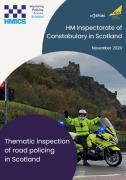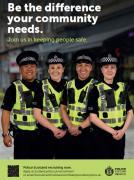
This site uses cookies, by continuing to use this site you accept the terms of our privacy policy
Feed 2.0 Loading...
Police Scotland aims to raise awareness of hare coursing
23rd September 2013
Police Scotland is today announcing the launch of a new campaign to target those involved in hare coursing, code named, Operation Lepus.
Operation Lepus is a national operation to counter hare coursing activity and this year Police Scotland will be undertaking targeted patrols in known hare coursing areas in an effort to apprehend the coursers. Hare coursing is a UK wildlife crime priority and an offence under the Wildlife and Countryside Act 1981. It is committed by a small number of individuals, who travel far and wide to indulge in this illegal activity. It is predominantly a seasonal crime, occurring during the spring as crops emerge into fields and during late Summer and early Autumn when the crops have been harvested.
The persons involved in this antisocial activity will use lurchers, greyhounds and whippet dogs which hunt by sight and are normally walked across fields on slip leads and are released when any hares run off. It has been known for multiple dogs to chase one hare and money to change hands depending on which dog kills the hare.
The Brown Hare (Lepus eurpaeus) is an animal of arable farmlands although it does occur on higher ground. The population of the Hare declined rapidly in the 1960's and 1970's before stabilising in the 1980's and good populations are found on the arable farmlands throughout Scotland. Hare breed between March and August raising their young in a shallow scrape in the ground known as a form, therefore at this time of year there will be a population of mixed ages. However, because they have no burrows hares tend to rely on vegetation and their colouration to camouflage them from predators. As a result they are currently particularly vulnerable because arable crops have been cut and they are easily seen on stubble fields and fields that have been sown.
Poaching and coursing are wildlife crime priorities and there are several issues associated with them that merit the attention of police. These include:
Public Safety;
Offenders may have access to firearms, not all of them licensed;
Rotting hare innards and other parts are a public health issue;
Livestock Safety;
Sheep/cattle (and horses) can be injured by lurchers and/or 4x4 vehicles;
Livestock can escape if gates are left open thereby causing traffic issues and potentially loss of income for farmers;
Animal Welfare Issues;
It is often the case that hare are not killed outright causing prolonged suffering;
Coursing dogs are run to exhaustion and sometimes injured;
Habitat destruction;
4x4 vehicles can cause considerable damage to wildlife habitats.
Research has shown that the type of person who takes part in this type of activity is often linked to other types of criminality. Typically, they will also be involved in other types of wildlife crime and are amongst the most prolific offenders in respect of wildlife crime. For those offenders, this type of crime is usually a 'status symbol', and can run from generation to generation.
The police cannot tackle this issue alone and will be working closely with partners organisations including Scottish Land & Estates and the National Farmers Union Scotland (NFUS) to raise awareness of the issue amongst their membership.
Officers involved in the operation will make contact with their local farmers and landowners with a view to establishing new information and to encourage closer working and sharing of information in the long term. However, the public in general and specifically the wider rural community all have a role to play in tackling this type of crime.
Where coursing has actually been witnessed, police officers can take action on the information from a single eye witness and can seize the dogs and any vehicles concerned if it is considered appropriate. Similarly, reports to police, and even historical reports made, can identify areas of hare coursing to police which can be investigated.
Sergeant Andrew Mavin, Wildlife Co-Ordinator for Police Scotland, said today:
"Wildlife crime is a high priority for Police Scotland, and as part of the wider commitment to tackling this type of crime, we're launching Operation Lepus, focusing on hare coursing.
"We're aiming to raise awareness about the issue of hare coursing across Scotland. We have dedicated wildlife crime officers across Scotland who work closely with landowners and farmers, and liaise with organisations such as the NFUS and the Scottish Land & Estates.
"Hare coursing is barbaric and the mindset of those who partake in such crime is beyond comprehension. I would urge anyone who wishes to report this type of crime, if they are a witness to this crime, or simply, if you are a farmer or a landowner and you'd like to report any suspicious activity or people on your land � particularly suspicious people with dogs such as lurchers or greyhounds � please contact police on 101."
Allan Bowie, vice-president of NFU Scotland, and of Allan's Farm in Fife, said:
"Farmers are better placed than they may realise to help prevent this gruesome form of rural crime.
"It is in our industry's interest to report suspected cases or incidents of hare coursing too, as the activity can cause distress among livestock; additionally, peopletaking part in hare coursing are often involved in other types of criminal activity, such as stealing agricultural machinery, trailers and tools.
"Operation Lepus has known local success in previous years, with scores of incidents reported by farmers and members of thepublic, and I am proud that our industry can help play a part in stamping out rural crime. Hare coursing still takes place, however, and I would encourage anyone living, working in and visitingthe countryside to report any suspicions that it is taking place to the police."
Paul Wakefield, Director of Operations & Communications at Scottish Land & Estates, which represents 2,500 landowners across Scotland commented:
"As a committed and active member of the Partnership for Action Against Wildlife Crime Scotland (PAWS) we are sadly only too aware of the ongoing issue of hare coursing, which becomes an increasing problem at this time of year.
"We and our members have been working in partnership with Police Scotland for a number of years and I am delighted to see that this has assisted greatly in crime prevention and enforcement measures. However, despite this concerted effort hare coursing remains a problem and we will continue to urge anyone who lives and works in the countryside to remain extra vigilant at this time and to report anything suspicious or out of place to the Police."
Related Businesses
Related Articles
6/11/2024
Police - Area Performance Report to Caithness Area Committee on 11 November
A report by the police to the Caithness area committee on 11 November will allow councillors to discuss a range of issues. Chief Inspector Calum Smith - Area Commander (North Highland Area Command) sets out the crime related figures up to June 2024.5/11/2024
Police Scotland Urged To Review Its Commitment To Road Policing
A reduction in police activity targeting the most common causes of fatal crashes has been identified as a key factor affecting Police Scotland's ability to keep people safe on the nation's roads. A new report by His Majesty's Inspectorate of Constabulary in Scotland notes that since 2020 the total number of people killed or injured on Scotland’s roads has increased each year.
2/9/2024
A836 In Caithness - Average Speed Cameras Go Live Today Monday 2nd September
Police Scotland's North Safety Camera Unit are now operating average speed cameras on the A836 between Reay and Thurso with offences being progressed from Monday 2nd September. In partnership with the Scottish Safety Camera Programme and the Highland Council, the location was identified as having speed concerns and increased traffic volumes, both of which are potential ongoing road safety challenges.
3/12/2023
Visiting relatives and friends this Christmas? Make sure your home is safe AFTER DARK
Consider carefully what you are putting on social media, especially if you are staying away to visit friends and relatives this Christmas. Be wary of posting photographs of Christmas parties that contain images of high value jewellery.
23/9/2023
POLICE OFFICER RECRUITMENT - CAITHNESS AREA
Would you like to join the Police? Would you like to live and work in the Caithness area? Police Scotland is actively recruiting good quality and eligible candidates specifically for the Caithness area. We are taking applications now for Police Constable / Special Constable Entry for future intakes during 2023/2024.
2/7/2023
£74m Police Budget Cut Will Make Communities Less Safe
UNISON, the union for police staff, says Scotland's police budget cut will see even more crime going unreported and crimes not being fully investigated. The union says around 230 police staff could be cut, including fingerprint examiners, forensic examiners, 999 call handlers, custody staff, high-speed driving instructors, cybercrime experts, payroll, HR and IT staff.19/1/2023
New Police Commander For Highland And Islands Division Takes Oath
The new Highland and Islands divisional commander will take up post having been sworn in as a Police Scotland officer. Chief Constable Sir Iain Livingstone welcomed and thanked Chief Superintendent Rob Shepherd during a ceremony at Police Scotland Headquarters, Tulliallan, on Monday, 16 January 2023, overseen by Justice of the Peace Gillian Thomson.
1/12/2022
Police Complaints, Investigations And Misconduct To Continue After Resignations
Gross misconduct proceedings against police officers should be allowed to continue after they resign from the force to promote transparency and maintain public confidence, according to a public consultation. The move, which would see proceedings continue even if an officer leaves during the course of an investigation into their conduct, was among the recommendations of Dame Elish Angiolini's independent review into how police complaints and allegations of misconduct should be handled.21/6/2022
Criminal Proceedings In Scotland 2020-21
The total number of people proceeded against in Scottish courts fell by 46% to 46,497 in the year to 2020-21, according to National Statistics published by Scotland's Chief Statistician today. The number of people convicted fell at a similar rate, down 44% to 42,532.9/2/2021


